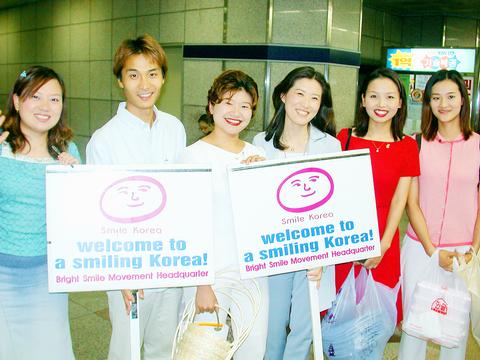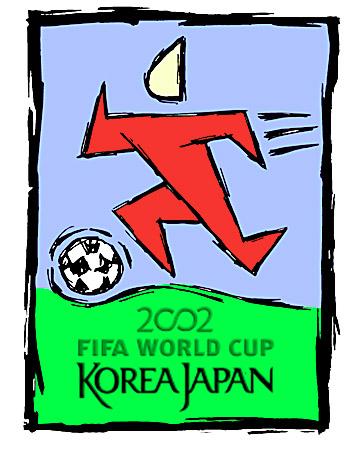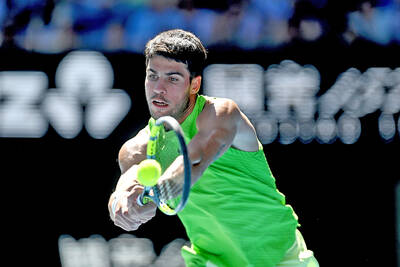World Cup soccer is teaching the South Koreans to smile, a member of the country's smiling movement claimed yesterday in Seoul.
Leading a posse of fellow "smiley" adherents on the subway to Incheon Munhak Stadium the day before for the game between France and Denmark, she told the Taipei Times the World Cup was a watershed in South Korea's 5,000-year history.

PHOTO: JULES QUARTLY, TAIPEI TIMES
Lee Woo-jung, assistant development team manager of the Bright Smile Movement, said she was "very serious" about this issue, after President Kim Dae-jung called on his country's citizens to warmly welcome visitors.

According to Lee, South Koreans have not been in the habit of making the facial statement denoting friendliness or something funny for over 500 years.
"In the Chosun Dynasty it was not fashionable to smile as this could have meant that you were not serious about something, or it could mean that you were laughing at a person in authority," she said.
"Korea has not smiled since then. Our smiling faces disappeared and now we have to learn how to do it all over again."
The group even has a teacher. Jung Pack-so is a "master of 10,000 expressions" according to her housemate and fellow Bright Smile Movement member Lee Jeong-hee.
"She teaches us how to smile. We practice our smiles every day in the morning [in front of the mirror]. We must exercise our smiles every day if we are to become better at it," she said.
Smile teacher Jung demonstrated how she taught her students.
She pointed to her head and said, "First, our minds must be bright." Then she pulled her cheeks. "Secondly, we must make muscle movements in our face." Then she touched her chest. "Now we feel happy in our hearts."
Lee Woo-jung said the World Cup was a historic opportunity to show foreigners that "we are a happy people. We very much want to share our international culture. It's one world and this is what a smile means. It will be a big change in our long history."
The Bright Smile Movement is affiliated to the Global Association of Culture and Peace, which is said to have 40 branches around the world, including in Taiwan.
While it cannot be said to be shadowy, the movement has some similarities with cults.
It was formed by Joshua Jung, who was born in, and developed a retreat at, a secluded village called Wolmyungdong in Geumsan County, a famous ginseng-growing area in central South Korea.
It is said to have the biggest natural rock landscaping park in the country and a "Fountain of Miracles" which some say can heal incurable diseases.
According to the Global Association of Culture and Peace, Wolmyungdong is a "masterpiece embodied with divine design although made by human hands."
The members of the group said they weren't all Christians, but when I asked each one of them, they all said they were.
Other members of the organization, dressed in traditional clothes, greeted World Cup fans outside Incheon Munhak Stadium.
The young women I met on the subway later dressed up in a uniform of short pants and tight tops on their missions to "spread a smile," while the young men in the group were said to be good singers and attracted female converts.
I did not find out what they were converted to; for that I would have to have taken a three-hour drive out into the country. And I'd had enough of smiling and wanted to watch some soccer.

The Philadelphia 76ers, fueled by 36 points from Tyrese Maxey and a triple-double from Joel Embiid, on Thursday beat the Houston Rockets 128-122 in an NBA overtime thriller. Cameroonian big man Embiid scored 32 points, grabbed 15 rebounds and handed out 10 assists, posting the ninth triple-double of his career to help the Sixers end the Rockets’ three-game winning streak. Rockets star Kevin Durant scored 36 points and Amen Thompson added 17, but Thompson was scoreless in the fourth quarter. Even so, the Rockets led by nine midway through the final frame, Maxey tying it at 115-115 with 40.1 seconds left. Durant missed a

Luka Doncic on Monday produced a 46-point masterpiece as the Los Angeles Lakers snapped the Chicago Bulls’ four-game winning streak with a 129-118 victory on the road. Doncic rattled in eight three-pointers on 15-of-25 shooting from the field, finishing with seven rebounds and 11 assists to lead an impressive Lakers effort at the United Center. LeBron James chipped in with 24 points, five rebounds and three assists, while Rui Hachimura delivered an eye-catching cameo off the bench with 23 points from nine-of-11 shooting. The win was another encouraging result for the Lakers after a 116-110 defeat of the Dallas Mavericks on Saturday. “We did

The Milwaukee Bucks’ Giannis Antetokounmpo on Friday said that he will probably be out for an extended period after hurting his right calf again after a similar injury caused him to miss eight games earlier this season. Antetokounmpo had his right calf wrapped in the first half of their 102-100 loss to the Denver Nuggets. He did not appear comfortable the rest of the night and left for good with 34 seconds remaining. “At the end, I could not move no more, so I had to stop playing,” Antetokounmpo said. The two-time NBA Most Valuable Player said he expected to undergo an MRI

Taiwanese FORTUNES: Wu Fang-hsien and Hsieh Su-wei both advanced to the last 16 of the women’s doubles, but Ray Ho was ousted in the men’s doubles Carlos Alcaraz yesterday stepped up his quest to win a maiden Australian Open as he overwhelmed showman Corentin Moutet to reach the last 16, while Taiwan’s Wu Fang-hsien and Hsieh Su-wei both advanced to the last 16 of the women’s doubles. Three-time finalist Daniil Medvedev battled through on day six at a warm and sunny Melbourne Park, as did Coco Gauff. Top seed Alcaraz was never in danger against French 32nd seed Moutet, easing through 6-2, 6-4, 6-1 at Rod Laver Arena in 2 hours, 5 minutes. It was the Spaniard’s 100th Grand Slam match and he boasts a remarkable 87-13 win-loss record,